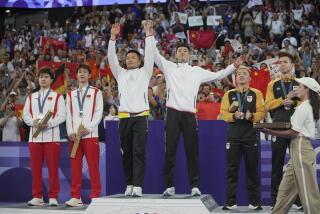Taiwan’s olive branch could snap
- Share via
TAIPEI, TAIWAN — In his first 100 days in office, Taiwanese President Ma Ying-jeou has helped arrange a series of high-profile meetings between Chinese and Taiwanese leaders, completed a historic agreement on regular flights across the Taiwan Strait and opened Taiwan’s doors to vastly more tourists from mainland China.
The moves have been welcomed in Beijing, which contrasts Ma’s cooperation with the pro-independence line of predecessor Chen Shui-bian -- a line it said would lead to war if ever acted on. Ma’s moves have also been praised in the United States, where his China moderation is seen as the best chance of keeping Washington out of a conflict it is striving to prevent.
But for all the enthusiasm over Ma’s approach, analysts warn that the bitterness of the past could still return. Beyond the immediate challenge of conducting complex commercial and political negotiations, the two sides disagree profoundly on Taiwan’s future status. Almost 60 years after they split amid civil war, China wants Taiwan to unite with the communist mainland, while the island of 23 million people wants to continue its de facto independence -- and its hard-won democratic freedoms.
At least for now, Ma is saying that any discussions on Taiwan’s final status won’t take place during his presidency.
Instead, he is pushing forward with a vaguely defined plan for a peace treaty with Beijing. The plan, unveiled during his presidential campaign, envisions ever closer commercial ties, followed by an informal agreement that would guarantee Taiwan latitude to conduct foreign relations.
As a final treaty step, the two sides would agree to demilitarize the Taiwan Strait, including Beijing dismantling about 1,300 missiles aimed at Taiwan.
Ma “has laid out a program of taking tangible steps toward change while downplaying the more sweeping or intangible issues such as unification,” East Asia expert James Mann of Johns Hopkins University’s School of Advanced International Studies said in an e-mail. “I don’t think what Ma has started is unstoppable -- but it is, by itself, quite important.”
Progress has come most easily in the commercial area, where both sides see benefits. Now Ma faces the thorny challenge of persuading China to allow it a bit of international space, says Andrew Yang of Taipei’s Chinese Council of Advanced Policy Studies.
For Taiwan, that means diplomatic recognition by other countries and an unspecified status in international organizations, such as the World Health Organization. Taiwan is not a member of the United Nations, though it participates in others, including the WTO, under names that leave its sovereign status deliberately ambiguous.
It is recognized by 23 countries -- most small and impoverished nations in Africa and the Pacific -- while China is recognized by more than 170.
Beijing’s official stance is that Taiwan has no need for any international space since the island is part of China.
This attitude was particularly evident during the presidency of Chen, whom Beijing reviled for his insistence that China and Taiwan are two separate countries. Underscoring its displeasure, Beijing convinced a number of Taiwan’s diplomatic allies to switch sides and recognize the mainland, and applied pressure that kept the island out of some international organizations.
George Tsai of Chinese Culture University in Taipei says that although China might be ready to suspend its wooing of Taiwanese diplomatic allies, it will probably play hardball on Taiwanese participation in international organizations.
“China does not want to create the perception that it accepts the idea of one China and one Taiwan,” Tsai said.
Tsai also believes that further progress on the commercial front could prove tricky, for business reasons. Ma wants to expand passenger flights between China and Taiwan and launch cargo flights.
“There’s a lot of money involved in these negotiations,” Tsai said. “The bargaining will be extremely complex.”
Tsai and Yang believe the most difficult issue confronting Ma is the demilitarization of the Taiwan Strait.
“This question will require difficult negotiations that need to be preceded by confidence-building measures,” Tsai said. “But that’s still far in the future. I don’t see early progress.”
Ma must also contend with the opposition party in Taiwan, which accuses him of incrementally selling out Taiwan’s interests and suggests that Ma’s Nationalist Party may be taking Taiwan toward eventual reunification.
Stoking their fears was a recent agreement between Taipei and Beijing on the name -- Chinese Taipei -- under which Taiwan competed in the Olympics.
The agreement was reportedly negotiated not by the quasi-official bodies established to adjudicate disputes between the sides, but by the Nationalist Party and its ruling Chinese Communist counterpart.
Opposition leaders saw this as seriously undermining the Taiwanese sovereignty that has been painfully built up over the last 59 years.
If so, Ma would have a lot of explaining to do to the Taiwanese electorate, which rejects unification with the mainland by margins approaching 80%.
More to Read
Sign up for Essential California
The most important California stories and recommendations in your inbox every morning.
You may occasionally receive promotional content from the Los Angeles Times.









